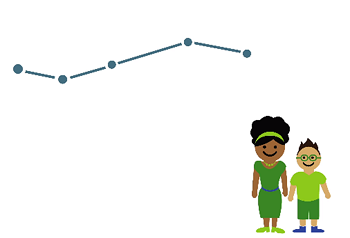Standards Based Learning Goals
The standards are a starting point for educational equity.
By defining the knowledge and skills all students are expected to learn in school by grade level and content domain, Minnesota’s K-12 Academic Standards and Early Childhood Indicators of Progress (ECIPs) provide a foundation for educational equity across the state.
School districts are required to put standards in place so all students have access to high-quality content and instruction. Schools and districts determine how their students will demonstrate mastery of the standards by developing courses, curriculum, assessments, and instructional materials.
The expectations for learning are the foundation of assessment.
The standards define broad learning goals for grade-level learning. More specific learning goals and targets must be crafted for units and lessons of instruction to achieve the broader goals articulated in the standards. Together, these goals are the backbone for interpreting assessment results and making valid claims about where students are in their learning.
Learning goals (also called learning targets or objectives) identify what students will be able to know and do by the end of one or a group lessons. Learning progressions identify essential questions and key understandings students should know across units of instruction and grade-levels within a content domain.
- Progress toward long-term goals and progressions across grades are best measured by summative assessments and/or interim assessments aligned to the standards at the classroom or school level, administered after a unit of instruction.
- Learning goals that are smaller in scope should be articulated for all lessons based on the standards. Measurement of learning at this smaller grain size is typically accomplished by formative assessment during learning.
- Learning expectations must be clear and transparent for students. Communicating learning goals effectively involves outlining success criteria, so all students understand what success looks like in relation to the content domain.

Resources
- Minnesota K-12 Academic Standards
- 2007 Mathematics Standards Progression Across Grades - 4/29/22
- This document provides The Minnesota K–12 Academic Standards in Mathematics in a format that shows progressions of the standards across grades. A graphic is provided to highlight a visual progression across grades, followed by the standards and benchmarks for each progression.
- Video Overview of Math Progressions document - 2/23/21
- This video explains three ways math educators can use the 2007 Mathematics Standards Progression Across Grades document.
- Developing Coherence across Curriculum, Instruction and Assessment: A model of learning/cognition - 2/7/23
- This article explains how assessment can guide information to improve instruction and curriculum when a research-based model of learning/cognition is centered.
- This article is used in both the Minnesota Data and Assessment Literacy Course for Educators or for Leaders in Module 1.
- Understanding Learning Targets - 1/9/20
- Learn the importance of using learning targets by watching two classroom demonstrations. Identify an audience and purpose for a learning target and write one for a classroom lesson or unit.
- K-12 Academic Standards Online Training Modules
- These modules are designed to guide educators, both individuals and teams, through a process for implementing a set of standards, from understanding the standards to examining student work. A module may include a protocol, discussion guide, video classroom demonstration or a link to resources.
- WIDA English Language Development (ELD) Standards
- ACCESS for ELLs is a large-scale assessment of English language proficiency based on the Minnesota Standards for English Language Development, developed by the WIDA Consortium. WIDA's standards outline the progression of English language development and exemplify how to teach academic language within the context of content area instruction.

